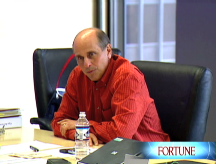Lessons of the fall
Ex-CEOs from JetBlue, Starbucks, and Motorola discuss what they learned when they lost their jobs.
 |
| From left to right: David Neeleman, founder of JetBlue; Jim Donald, former CEO of Starbucks; and Ed Zander, former CEO of Motorola. |
(Fortune Magazine) -- What goes up must come down. It's a law of CEO physics. Every year a few star bosses succumb to it and lose their jobs. Most reemerge smoothly a few years later with a new job, an investment fund, or a philanthropy project. But whether it's out of shame or an optimistic focus on the future, few ever discuss what it's like - for a CEO, a spouse, or even the CEO's kids - to survive the fall from a corporate pinnacle.
In mid-May, Fortune lured three of these former chiefs to Manhattan to trade insights on some of their bumpy moments at the top and on what came after. Jim Donald, who spent most of his career in the grocery industry (including three years building Wal-Mart's supercenter business), enjoyed two smooth years as CEO of Starbucks, perking up the company's share price from $26 to $39. But when sales sagged and the stock dropped by nearly half in 2007, Starbucks chairman Howard Schultz fired Donald, now 54, and reinstalled himself as chief executive.
Another onetime highflier, Ed Zander, 61, went from No. 2 at Sun Microsystems to CEO of Motorola in 2004. He made the RAZR the best selling cell phone in history, then fumbled the follow-up. Profits collapsed, as did Motorola's stock price, and Carl Icahn began agitating for change. Zander stepped down at the end of 2007.
Both Zander and Donald were noticeably anxious when we convened on May 14. The third participant, David Neeleman, didn't seem nervous at all. Neeleman is the freewheeling entrepreneur who in just eight years built JetBlue into the eighth-largest U.S. airline and a model of innovation and customer service. At least that's how it was seen until a 2007 ice storm pounded JetBlue's reputation and Neeleman's career. The board replaced him as CEO, though he remained chairman until this May. Neeleman, as we'll see, is the only one of the three who has decided on his next chapter. But all three had plenty to say about their lives at - and after - the top.
Describe your last job - in a sentence.
Neeleman: When we started flying, oil and gasoline was 70 cents a gallon. Today it's $3.50. We burn half-a-billion gallons of the stuff every year. In a sentence, it was a wild ride. An absolutely crazy, wild ride.
Zander: That's a paragraph!
Ed, your run, in a sentence?
Zander: Fun, lots of fun. I'd do it again in a second. Hard. Hard and challenging, probably the toughest job I've ever had.
Donald: We went from 4,000 stores to 16,000 stores, from 20 countries to 40 countries. The sentence would be: Working for the Starbucks employees is a very humbling experience.
You were all hotshots who stumbled. What might you have done differently to prevent it?
Neeleman: We were like a frog that got boiled one degree at a time by rising oil prices. We had a board member who, when oil got to $50 a barrel, said, "Don't hedge, it's going back down to $25."
And you believed him.
Neeleman: They seemed to know what they were talking about. The second thing is - and I realize it now that I'm a board member, looking at the company through this little hole once a quarter at a four-hour meeting - board members don't know that much about the company. They really don't. I would've been much more engaged with the board. After the February storm, I was so busy trying to hire a new COO, get someone at Kennedy Airport, do all these things, that I didn't have time to update the board on everything. If you don't, somebody else will. You have to be able to give them an accurate picture of what's going on, or they develop their own perceptions and start creating their own stories. And then they make their decisions. How do you keep these people up to date and give them the whole picture? That's the job of the CEO, and I failed.
Donald: I made it a habit of every other week updating the board through an e-mail on revenue, any store openings, any issues around the world.
Neeleman: When things start going south, communication should increase. Even if you think you're doing enough, you're not doing enough. I didn't do a good enough job because [board members] developed their own perceptions of where things were headed.
Zander: I had kind of a Jekyll-and-Hyde situation. I had three marvelous years - I could almost do no wrong. The last year, the problems were in one division, the mobile-cell phone division. As it came around in 2007, we weren't ready. There was a bust in the software platform. We missed execution in our products. When you don't have the products to put on AT&T and Verizon and Vodafone's shelf, you're going to pay the price, because it's a very, very punishing market.
What could you have done differently, Jim?
Donald: My worst decision was not investing earlier in international. The international markets don't have as quick returns as the U.S. But if I'd known the U.S. economy was going to crash, I would have invested earlier.
If we're talking woulda, coulda, shoulda, what would you say, Ed? Zander: I go back, and the big thing was people. I didn't move fast enough on some people. I know it sounds trite, but as a CEO, you can't design a cell phone. It's the people you hire. You always talk to CEOs and they always tell you that when you come in, you've got to move fast on people. And there's some truth to that. I took a different approach at Motorola. When I first got there, I moved fast on a few people, promoted a few from within, and waited, and actually got some real stars from the people that I looked at. But in the case of the mobile business, I think there had to be some changes made quicker. One or two that I missed really cost me.
Ed, did you handle Carl Icahn as well as you could have?
Zander: Look, activists are part of, it seems, today's business world and more so than in the past. And they're shareholders, and you have to treat them as shareholders. I would say that it is distracting. I spent a good amount of time trying to fix some of the business, spending a lot of time with that proxy battle. But you've got to deal with it and move on. I was taught early on - this goes back to my beginning days in the computer businesses - you build long-term value. So to me, in driving Motorola in the good days of 2004, 2005, 2006, and then the mobile division hit the wall, [the goal] was to keep focusing on where we had to go, what decisions I had to make, what the long-term strategy was - don't do anything for the short-term. And sometimes that's painful for short-term shareholders.
In that sense, do you think that Icahn and other activists of his ilk are unhealthy for corporate America?
Zander: I'm going to -
Oh, come on, you've got to go -
Zander: No, I'm going to stop there. I'm just going to say that I handled it the way I wanted to handle it, and I think the company is stronger and has a long-term strategy.
Talk about your toughest day.
-
 The retail giant tops the Fortune 500 for the second year in a row. Who else made the list? More
The retail giant tops the Fortune 500 for the second year in a row. Who else made the list? More -
 This group of companies is all about social networking to connect with their customers. More
This group of companies is all about social networking to connect with their customers. More -
 The fight over the cholesterol medication is keeping a generic version from hitting the market. More
The fight over the cholesterol medication is keeping a generic version from hitting the market. More -
 Bin Laden may be dead, but the terrorist group he led doesn't need his money. More
Bin Laden may be dead, but the terrorist group he led doesn't need his money. More -
 U.S. real estate might be a mess, but in other parts of the world, home prices are jumping. More
U.S. real estate might be a mess, but in other parts of the world, home prices are jumping. More -
 Libya's output is a fraction of global production, but it's crucial to the nation's economy. More
Libya's output is a fraction of global production, but it's crucial to the nation's economy. More -
 Once rates start to rise, things could get ugly fast for our neighbors to the north. More
Once rates start to rise, things could get ugly fast for our neighbors to the north. More










